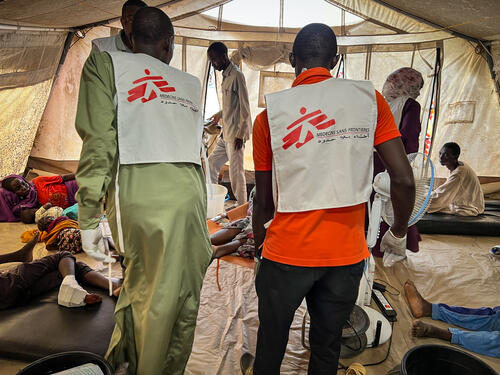A new start: Counselling in South Sudan
When a young woman arrives at the MSF hospital in Lankien, medical treatment is not the only care she needs. Mental health supervisor Ngueny Deng Pal shares the story…
I will call her Mary, which is not her real name. Mary had been treated at our hospital after experiencing sexual assault. After the medical team had seen her, they asked if she would like to talk to someone about how she was feeling; she said yes.
I’m the mental health supervisor here in Lankien, a town in northeast South Sudan. The MSF hospital here is the only one in the area; people travel long distances to reach us. A year ago we began offering mental health services alongside physical healthcare.
In most communities in South Sudan there are taboos around sexual violence. It’s unthinkable – you simply cannot believe that this would happen to you. And those taboos feed into other people’s attitudes too. Mary’s husband had learned of the assault and had broken up with her because of it. In his eyes, she had been “ruined”.
Overwhelming
In that first counselling session, Mary described huge, overwhelming feelings. She didn’t know what to do. She felt like her future had ended.
I asked her what she thought might help. What were the alternatives available to her? Together we went through everything she could think of. I didn’t guide her to one conclusion or another – that’s not the job of a counsellor. But I did give her the space to think about it with someone else, so she wasn’t just on her own at home.
Patient-centred care
One of the things Mary raised was traditional coping mechanisms in South Sudanese culture. In our community, we have traditional healers who you can go to when you’re unwell or if there are difficulties in your life. Mary wondered if that was something that might make a difference for her.
Now, MSF does not recommend traditional healing rituals for patients, or see them necessarily as a form of therapy. But as a counsellor, my role was to support Mary to identify ways of dealing with this trauma that were meaningful for her. This is what patient-centred care is all about: recognising and supporting patients’ rights to make decisions about their health.
A change
By this point we’d been talking for a long time, so I asked Mary if she would like to take some time to think, and to come back for another session. When she returned we talked it through and she made a decision: she would go to her father and if he allowed it, they would go to the traditional healer.
At our next meeting, I could sense the change in Mary immediately. The discussion with her father had gone well. They had gone to the healer together, and he had performed a ritual, which had left Mary feeling relieved. She said she felt like she could go on with her life again.
So then our session shifted. We used the same approach: talking through her options and the alternatives for what she wanted to do next.

Our work saves lives
A good moment
The last time I saw Mary she was married again and very happy. She told me how glad she was that she had come to our service. She was feeling well and was ready to finish our sessions, but she fed back that the work we’d done together had helped her a lot, by giving her new strategies she hadn’t known before.
It was a very nice moment for me – I decided to work in mental health because I could see the gap that we have here in South Sudan, where there are real needs but very little treatment or support available.
Hope for the future
I’m proud of the work we are doing here, and I also know how much change like this is needed in our community, where there can be real stigma attached to mental healthcare. My hope is that that people like Mary will talk about their experiences of counselling, and the next time someone is facing something similar, they’ll feel more confident in taking the same steps she did.
Names have been changed
MSF in South Sudan
In July 2011, South Sudan became the world’s newest country after gaining independence from Sudan. The peace deal that led to the split also ended Africa’s longest-running civil war.
But in December 2013, South Sudan was plunged back into chaos as civil war erupted amid a power struggle between the president and his deputy.
The conflict has forced millions of people from their homes and left many without access to basic necessities, such as food, water and healthcare. Médecins Sans Frontières/Doctors Without Borders (MSF) works in hospitals and clinics throughout South Sudan, where we run some of our biggest programmes worldwide.
As well as providing basic and specialised healthcare, our teams respond to emergencies and disease outbreaks affecting isolated communities, internally displaced people and refugees from Sudan.


